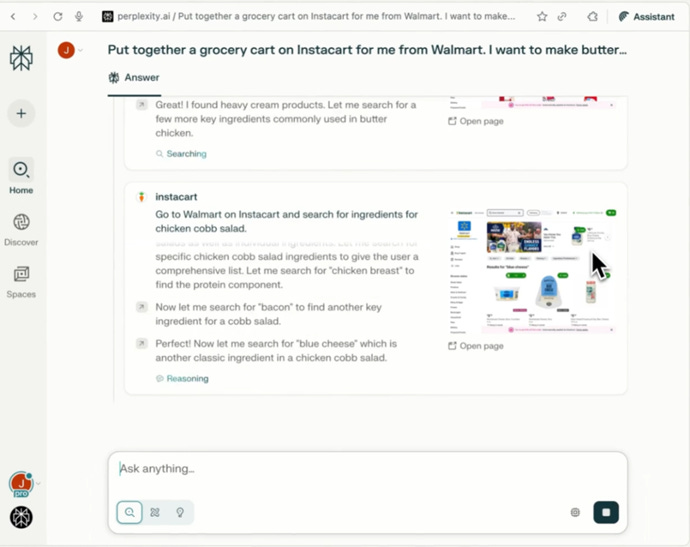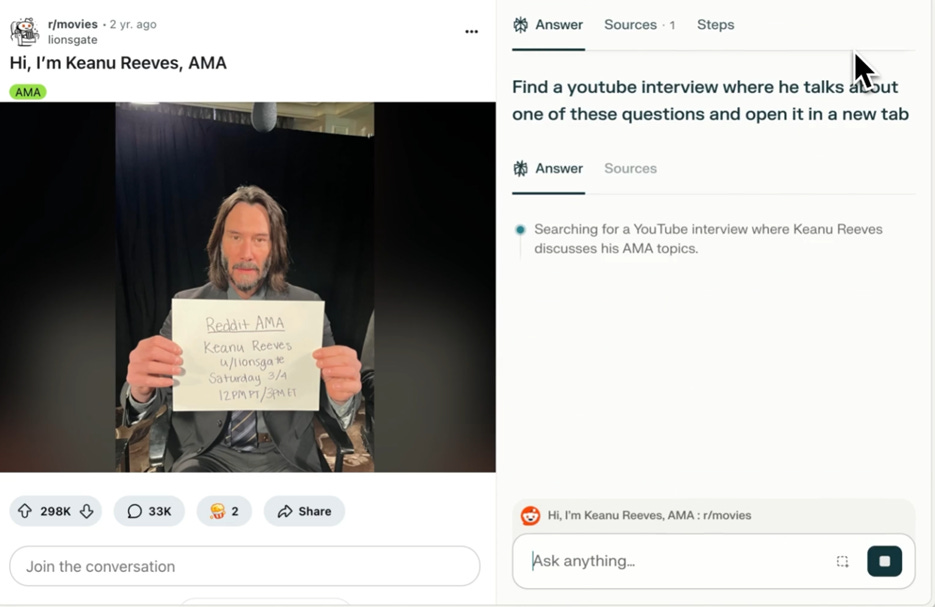AI Comes for the Browser
The release of the Perplexity Comet AI browser heralds a slew of competitive AI browser offerings.

Introduction
Many of my articles on AI Changes Everything in the past year have the rise and spread of powerful AI agents:
The Model Context Protocol (MCP) has standardized AI agent connections to tools and data, making it easier than ever to develop more powerful AI agents.
This has enabled the rise of more powerful general AI agents, exemplified by the Manus AI.
We know how to best design effective AI agents, combining advanced AI models with capable tools connected via MCP in simple workflows to yield powerful AI Agents.
AI coding assistants are the leading edge of AI agents, and with MCP tools are able to do much more than write code. Coding assistants like Gemini CLI, powered with MCP, can be used as generalist AI agents and execute local commands, and Cursor plus MCPs can run an entire business, able to build and run business dashboards on the fly.
AI agent use has reached a tipping point, getting further embedded in many businesses and consumer use cases.
Now, agentic AI has come for the browser. Perplexity’s Comet browser, released last week, is the latest herald of this new wave. Let’s dive in.
AI Reinventing the Browser Experience
Perplexity Comet is not the first AI to this “disrupt the browser” party. There have been various AI agents or AI assistants that (partially) automate web browsing built and implemented as browser extensions or standalone AI agents, centered on these capabilities:
Browse the web, extract data, and interact with websites on behalf of the user.
Automate repetitive online tasks such as form filling, data entry, and information retrieval.
Integrate with APIs or operate through the browser interface, often using natural language commands.
There are two approaches to present these capabilities without building a stand-alone browser.
First, AI browser features can be integrated as browser extensions. AI assistants can augment a user's existing browsing experience with a layer of AI-powered assistance as browser extensions in browsers like Chrome. They provide context-aware support and enhance productivity of common digital tasks when interacting with webpages.
Examples of this are Leo AI assistant in Brave and Copilot extensions in Chrome. These are helpful but not game-changing since they cannot operate the browser itself; they are more like chatbot AI assistants.
Second, standalone AI agents that invoke browsers automatically. The three leading examples of this are from the 3 leading AI labs: Anthropic Computer Use, OpenAI Operator, and Google Project Mariner. These offerings show great promise, as they operate in ways to actually do things on the web, but as of now, they are also fragile beta products.
Another important capability to make all this work is infrastructure that provides browser functions for AI agents. BrowserBase provides scalable infrastructure for adding web browsing capabilities to AI applications, by running a headless browser that AI agents can invoke ‘under the hood.’ This category supports stand-alone AI agents with browser capability but is invisible to the user.
The AI-First Browser
It’s remarkable that in an era of massive technology shifts, the Chrome browser of 2025 still is in many ways similar to the Netscape browser of 30 years ago. It’s faster and much more capable for sure, but it has similar protocols, standards, and user interface conventions.
AI is set to change all that.
It makes sense to rebuild the web browser from the ground up and make it AI-first, to keep the AI and the web browser integrated. That way, information isn’t dropped, and the interface is consistent.
What would an AI-first browser look like? Three AI browsers have been released as alpha or beta releases recently: Perplexity’s Comet, DIA (by The Browser Company), and Neon by Opera. These give us a glimpse of what an AI browser might look like and what features it would have.
Perplexity’s Comet Browser
Perplexity Comet is an AI-powered browser built on Chromium, integrating Perplexity's AI search engine and a sidebar assistant called Comet Assistant. It features a hybrid AI architecture: local processing for basic tasks, cloud APIs for complex operations.

Comet’s key AI features center on answering questions about webpages, and automating virtual tasks like booking meetings or making purchases:
Web interaction: A dedicated assistant button allows you to interact with your open tabs. The assistant can analyze YouTube videos, Google Docs, and articles without switching tabs, summarize videos or websites that were watched or visited.
Organizing information: Comet can highlight interesting news from news feeds, close files and tabs not touched in days, and group research tabs into collections.
Scheduling: Comet can check your schedule, show who you’re meeting with, list action items for the day, and change meetings to a different time.
Search: All searches in the URL bar and new tabs default to Perplexity's AI search. This has voice input, enabling voice-based web search.
Automations: Comet can automate tasks like accepting LinkedIn connection requests, checking product stock on e-commerce sites, and composing and posting tweets.

Comet prioritizes privacy, offering local data storage and strict tracking controls. Local Operation has several benefits over cloud-based AI agents. It’s faster and more cost-effective, and you can maintain your authentication and context from your current web sessions, so you don't have to re-authenticate for various tasks.
It has a native ad blocker and seamless migration from Chrome; Comet is built on the Chrome (Chromium base) browser, so you can easily import your settings, bookmarks, and extensions.
Perplexity aims to shift browsing from manual navigation to AI-driven cognition. It’s a tall order to challenge Google Chrome's dominance, but there is an obvious reason to go this route: control. If the Perplexity AI agent depends on another browser as the interface, it could lose control of what features it can present and have to chase browser interface updates.
Dia from The Browser Company
Dia is an AI-first browser from The Browser Company, creators of Arc, focusing on deep AI integration of online activities. The Browser Company has been on a mission to change how browsers work, yet up until now, browsers have been remarkably resistant to change:
While all of our other software tools are changing for the better - with more collaborative features, flexible interfaces, and powerful functionality - the browser largely still does what it did twenty-five years ago.
AI could change that. The AI browser Dia is designed for users seeking a seamless blend of browsing and AI assistance, reducing friction between searching, reading, and acting. Dia uses AI in several innovative ways and has the following features:
An AI chatbot sidebar assistant observes all websites visited and assists with information retrieval and task completion. It can discuss current tabs, open tabs, and browsing history.
The Dia URL bar doubles as an AI command interface for searches, website navigation, and AI-powered actions.
A skills feature allows users to create custom code snippets for browser automation.
Opt-in history context for more personalized AI responses.
An inline copy editor for AI assistance on writing emails.
Launched last month, Dia is currently in invite-only beta and works for now only on MacOS.
Conclusion - Vibe Browsing
In my article “The Era of AI Adoption” I used the phrase “vibe everything” to denote how AI will help automate almost every virtual activity. Due to the “jagged frontier” of AI capabilities, technology, business, and society will be affected by AI unevenly and at varying times. For every technology and capability, AI will at some point become powerful enough to disrupt it.
Now is the time for AI to disrupt the browser.
I have to confess that between the invite-only barriers, only MacOS, and Perplexity MAX subscription price, I haven’t tried these AI browsers yet. Thus, I cannot vouch for whether these particular iterations will be hits or miss the mark.
However, I do believe the AI browser will be a winning AI interface, and I’m not alone. Beyond the bet Perplexity is making with Comet, companies like OpenAI are betting that a standalone AI agent isn’t enough. OpenAI is reportedly releasing an AI browser in the coming weeks. Google’s Agent mode could also refactor their browser.
The lowest-friction interfaces win, which favors the AI-first browser, as it will be seamless to migrate browser habits and allow AI automation to take care of more and more web-based ‘grunt work.’ If an AI-first browser can get the information in front of users, but AI enhanced and AI-enabled, with zero friction, there will be no reason not to adopt it.
The AI labs will be innovating and experimenting to get to the right feature set and interface controls.
Enjoy experimenting and playing with the new AI browsers as they get released more widely. As with the stand-alone AI agents using web controls, it’s early and they will evolve and improve. Vibe browsing will become a thing as AI browsers remake how we browse the web.



